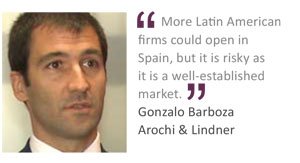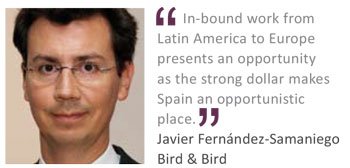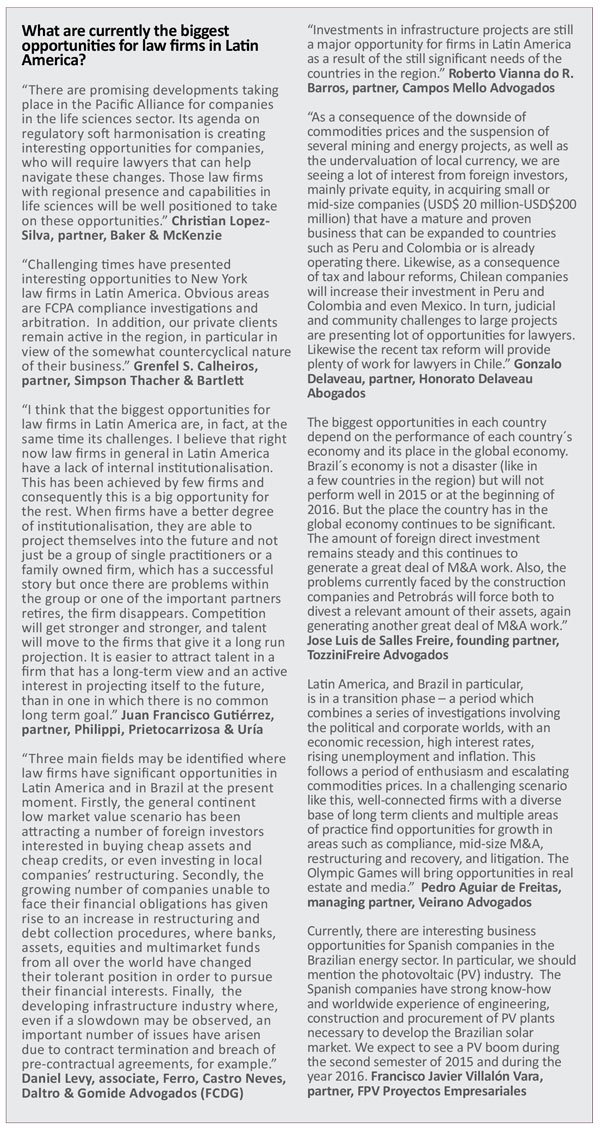Special Report 2015 Latin America: On safari
Latin America´s emerging Pacific trade bloc – consisting of Chile, Colombia, Mexico and Peru – offers a wealth of opportunities for law firms in Spain, but to win the hunt for business offered by the ‘Pacific Pumas’, firms will have to tread carefully
The Latin American market is becoming increasingly important for law firms in Spain, but what´s the best way to crack it? The rise of the Pacific Alliance countries – namely Chile, Colombia, Mexico and Peru (which have been collectively dubbed ‘The Pacific Pumas’) – have excited investors and law firms alike. Uría Menéndez is one of the Spanish firms to have bet heavily on this region with the formation of Philippi, Prietocarrizosa & Uría. Other law firms looking to follow suit are warned to develop their strategy carefully – such a move involves considerable investment and the selection of the right partners. It is also vital that the partners a firm chooses properly buy-in to the project.
The thawing of relations between Cuba and the US has also wedged open a window of opportunity, but law firms in Spain must act quickly if they want to capitalise – it is anticipated that an international firm will open in Havana soon and the betting should not be against it being one of the US players. Meanwhile, one of the other issues facing law firms in Latin America is corruption, the shadow of which is never far away – lawyers warn of ‘state attorney mafias’, particularly in Mexico. All in all, opportunities abound in this wildly diverse region, but only the most astute law firms will be in a position to capitalise. 
Pablo González-Espejo, partner at Uría Menéndez, says there are currently two main opportunities for law firms in Latin America: “Law firms in Spain are exploiting the Spanish connection with the region – Spanish firms are now more aware of the opportunities there, while non-Spanish firms are using their Spanish partners to develop a practice in Latin America, for example UK firms are focusing on Latin America from their Spanish offices. Meanwhile, there is also a trend for in-bound Spanish investment from Latin America into Europe – they are using Spain as a base [to access European markets].”
Bird & Bird partner Javier Fernández-Samaniego says that while UK firms do not have a significant strategic interest in Latin America – and instead prefer to focus on locations such as Singapore and Hong Kong – most European clients that do have interests in the region ask for the firm’s Madrid office to be involved in the work. He adds: “In-bound work from Latin America to Europe presents an opportunity as the strong dollar makes Spain an opportunistic place.” Fernández-Samaniego adds that Cuba also has potential – largely due to the expertise of Bird & Bird partner Hermenegildo Altozano – but he does not see any UK firm opening in Latin America in the near future. Jones Day partner Javier López Antón says that law firms seeking to make a success of a Latin American office need to be prepared to put sufficient financial resources into the venture: “To be a player, you need to make a relevant investment.”
LatAm firms opening in Spain?
Gonzalo Barboza, partner at Arochi & Lindner, a Mexican firm that opened an office in Barcelona in 2014 says that with Lain American clients investing in Europe, there were many reasons for opening an office in the Spanish market. He adds: “More Latin American firms could open in Spain, but it is risky as it is a well-established market.” Barboza says that Arochi & Lindner practices intellectual property law, which is a “very specialised area”, and that it would be harder and would require a bigger investment for a Latin American firm that practiced other types of law to establish an office in Spain.
Broseta partner Julio Veloso believes that, while law firms may have different strategies depending on their clients, it is “natural” for law firms in Spain to look to expand in Latin America. “Most of us are focused on Latin America and there are now opportunities for Latin American countries to come into Europe – we [Spain] can be the gateway into Europe,” he says. “We also have a great opportunity to be a hub for investors from Europe and China, for example, to go into Latin America.” Veloso highlights the fact that investors are showing an interest in Colombia, Peru and Mexico, in particular.
Commenting on Uría Menéndez´s decision last year to take a 30 per cent share in a new firm created as a result of merger between two of its “best friends” in Latin America – Chile-based Philippi, Yrarrázaval, Pulido & Brunner and Prietocarrizosa of Colombia – González-Espejo says: “We set up in Chile and Colombia and we intend to expand in Peru and subsequently Mexico.”
López Antón says that, for Jones Day, the Pacific Region is the target. He adds: “Central America does not have the volume or size of business, we are in Brazil, but there are legal hurdles to be overcome there.”
 Don´t be naive
Don´t be naive
Fernández-Samaniego argues that Cuba currently offers a “window of opportunity”, but he adds: “Sometimes in Spain we can be a little naive in underestimating US influence in the Central America and Caribbean region – on Cuba I think we will see soon which is the first Spanish or international firm to open in Havana but that movement requires courage and a long-term view.” Fernández-Samaniego continues: “Our firm is very active there through Hermenegildo Altozano´s Cuban practice but we don´t contemplate immediate openings in Havana or elsewhere in the region but rather strengthening other ways of cooperation with our selected local best friends which have proven to be successful for our specific client needs.”
González-Espejo says that Uría Menéndez is monitoring recent developments in Cuba, but he adds: “There are few certainties there, you have to make sure that it is not only about doing PR – to Spaniards, Cuba has a romantic attraction, but thinking rationally, at this point we need to focus on understanding the implications for clients arising from investing in Cuba.” One partner at a major international law firm says that Canada, Spain and the US already have a lot of business in Cuba. He adds: “Cuba is a place that needs to be built from scratch.”
Veloso says he is surprised that there is not a law firm covering the whole of the Latin American region. “There was an opportunity for big Spanish firms to become a big regional player 15 years ago, but we now have strong Latin American firms and growth is expected to average 2.3 to 2.5 per cent in all countries this year,” he says. “It´s much tougher now for Spanish firms, but a firm like Uría Menéndez or Garrigues may try it.”
Barboza says that the best strategy for law firms in Latin America is to “understand the clients and legal environment in each country”. He continues: “You have to adapt the rules and procedures as each Latin American country is different – whereas there is more homogeneity in Europe.” However, Barboza believes there will be a pan-regional firm at some time in the future. He adds: “There are more US firms opening in Mexico, it is a huge market.” López Antón argues that Mexico is not an easy market for foreign law firms to break into. “There are firms there with close links to the government and with major clients.”
Veloso adds that people can be “very nationalistic and chauvinistic in Mexico”. One partner at an international firm says that it is “impossible” for foreign firms to do business for the Mexican government. “It´s a very nationalistic country,” he says. “There is a ‘mafia’ of state attorneys and we have been a victim of this quasi-corrupt approach.” Veloso says: “A common mistake the Spanish make is that we believe that because we speak the same language, it will be the same as being in Spain – it´s not.”
Risking your reputation
González-Espejo says one of the big challenges of providing legal services in Latin America is ensuring that client expectations are met. “It requires resources from head office as you have to deliver a deal overnight, there are cultural differences [in Latin America], you always need people on the spot, we have partners in Chile and Colombia and they are supported by additional lawyers,” he says. González-Espejo adds that in order to develop this type of working environment, associate lawyers from Chile and Colombia come into Uría Menéndez and develop several “joint training” initiatives. He continues: “We [Uría] have seven or eight partners working daily helping on the integration of Philippi, Prietocarrizosa & Uría (PPU).”
Fernández-Samaniego says that another challenge for law firms looking to open offices in Latin America is the protection of their reputation. “Firms main task is selecting the right people – corruption is a big thing in most Latin American countries,” he says. “The regulatory environment is also a challenge – meanwhile, individual countries have other specific challenges, for example Argentina is a great source of business, but there are challenges such as currency control issues and regulatory changes, for example.”
López Antón believes that finding the right partner in Latin America in order to truly become a local player is the challenge facing foreign law firms that want to open in the region. “We [Jones Day] found the right partner in Mexico, but it´s not always easy [for firms] to combine and share the same targets,” he adds.
Fernández-Samaniego says that most lawyers in Latin America “speak extraordinarily good English and show good levels of commitment”. He continues: “We work with partners in Brazil who have plenty of work – it would be difficult for foreign firms to attract them as they don´t want administrative burdens or conflicts of interest.”
Veloso says the challenge for law firms looking to capitalise on opportunities in Latin America is to “bet on what might happen”. He adds: “Our challenge is that the world has changed, the Latin American region is now becoming attractive, there are a lot of investors and lawyers are looking at them – there is room for lots of different strategies.”
Barboza says he understands the hesitant approach of big firms when it comes to using their brands in Latin America. “Such firms might have to explain to clients why they cannot deliver the same way in certain territories as they do elsewhere,” he adds. “From my own experience as an in-house lawyer, it can be sometimes hard to implement solutions for different jurisdictions in Latin America without the flexibility to adapt to local conditions.”
 Copy the ´Magic Circle’
Copy the ´Magic Circle’
The quality of lawyers in Latin America is “extremely good”, according to Veloso. “The challenges are to manage clients’ expectations and timescales – clients think the market is the same as it is in Spain, but it´s not.” Fernández-Samaniego says that local players in Latin American legal markets will face the challenge of globalisation. He adds: “The winning strategy will be to try to do what the ‘Magic Circle’ firms did in Europe, but US firms have the best chance of achieving this.” Barboza says the key to success for foreign firms in the Latin American market is “forming the right umbrella firm that the local market can identify with in addition to finding the right local partners”. He adds that he thinks Uría Menéndez´s approach [of taking a 30 per cent stake in a newly merged firm spanning Colombia and Chile] is “likely to succeed”.
González-Espejo says that, in order to properly define a strategy, it is important that law firms do not look on the exercise as “we´re going to Latin America”, instead it is important that the local lawyers involved “feel they are part of their project”. He adds: “Local lawyers are sophisticated and have great careers in a growing environment, if PPU succeeds, it will be because we have made all the partners in Spain, Portugal, Chile and Colombia feel part of a joint project.”
Fernández-Samaniego adds that the “recipe for success [for foreign firms in Latin America] is to attract and retain the best local talent”.
Veloso says it is a mistake if law firms think they can go into Latin America and teach lawyers how to do business. He adds: “The key is to approach it in a humble way, we are guests in their countries.” Bernardo Gutiérrez de la Roza, founding partner, Ontier, says: “Today, [in Latin America], it is not enough to be experts in the local law and its legal system. Law firms also need to be familiar with the cultures and the society of the countries where they operate.”
Latin America has plenty to offer in terms of growth opportunities for law firms in Spain. The ‘Pacific Pumas’ are hunched and ready to pounce, while Cuba, to use business parlance, offers “clear blue water” for firms willing to take the plunge. But establishing a presence in Latin America is fraught with potential pitfalls. The opportunities are there for all to see, but in order to take them, law firms must develop their strategy carefully.
















